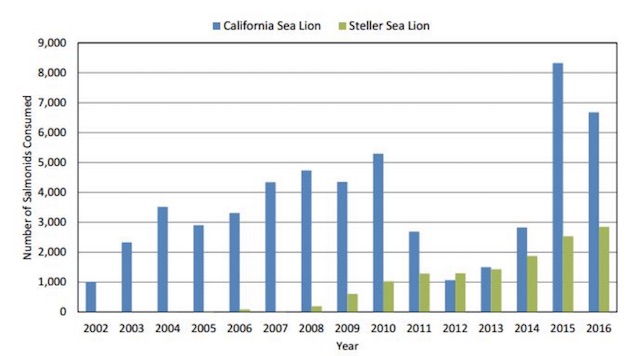forum
library
tutorial
contact

Washington Farmers say Harbor Seals
to Blame for Salmon Struggles
by Simone Del Rosario
Q13 Fox News, June 29, 2018
|
the film forum library tutorial contact |

|
Washington Farmers say Harbor Seals
by Simone Del Rosario
|
"We've literally invested hundreds of thousands of dollars, if not millions, into salmon restoration,"
Werkhoven said. "Our frustration is we're really not seeing the results we'd expect."
 MONROE, Wash. -- The Northwest's Chinook salmon is in jeopardy. To protect it, this week the U.S. House of Representatives passed a bill that supports killing sea lions in the Columbia River.
MONROE, Wash. -- The Northwest's Chinook salmon is in jeopardy. To protect it, this week the U.S. House of Representatives passed a bill that supports killing sea lions in the Columbia River.
One unexpected group is speaking out to say the real culprit is harbor seals and the same measures should be taken to control the population.
Washington's agriculture community plays an active role in trying to save the Chinook salmon. Farmers like Jim Werkhoven understand the part agriculture plays in changing habitats where Chinook salmon have struggled to thrive.
"We have an obligation to help in that recovery effort and we accept that," Werkhoven said. "We've worked really hard as an industry and as a community to make that happen over the years."
About 20 years ago, Werkhoven's farmland in Monroe had a series of disconnected ponds. Because of his work with the Tulalip Tribes, the ponds now connect and run to the river, giving young Chinook salmon a safe place to grow.
"We've literally invested hundreds of thousands of dollars, if not millions, into salmon restoration," Werkhoven said. "Our frustration is we're really not seeing the results we'd expect."
He says harbor seals could be to blame. Like sea lions, they are protected under the Marine Mammal Protection Act of 1972. Since then, federal data shows the populations have multiplied.
But because of these protections, it's taking an act of Congress to approve killing 100 sea lions in the Columbia River. Meanwhile, studies show harbor seals in the Salish Sea are eating Chinook before it matures.
It could play a part in what's threatening the food source of another Northwest icon, the endangered Southern Resident killer whale. There are just 75 orcas left and some are starving from lack of food.
According to NOAA, there are currently 10,000 to 15,000 harbor seals in the Puget Sound.
"I'm going to let the experts decide what has to happen, but it would seem to me the population would have to be reduced or controlled by some means," Werkhoven said.
"If someone says farmers are deflecting by suggesting this, what would you say?" asked Q13 News Correspondent Simone Del Rosario.
"I'd say come on out to the farm and take a look and I don't think you'll say that when you're done," Werkhoven answered.
Of course, there are several parties who are against controlling predator populations as a means to save the Chinook salmon. Rep. Raul Grijalva, D-Ariz., is one of them. He voted against the House bill to kill 100 sea lions.
"It does not address the root cause of salmon population decline and instead unfairly scapegoats sea lions," Grijalva said.
He said the root causes of dwindling salmon populations are overfishing, hatcheries, hydropower dams and human overpopulation.
Rep. Jamie Herrera Beutler, R-Wash., co-sponsored the bipartisan sea lion legislation in the House. There is a companion bill in the Senate co-sponsored by Sen. Maria Cantwell, D-Wash.
Q13 News asked Herrera Beutler's office if she plans to look into harbor seals as a possible solution. Her office said that after years of work on the existing legislation, her energy is focused on getting it signed into law.
Related Pages:
Predatory Sea Lions Are Detrimental to Columbia River Fish Runs by Gerry Lewis & Paul Ward, NW Fishletter, 5/1/17
learn more on topics covered in the film
see the video
read the script
learn the songs
discussion forum
